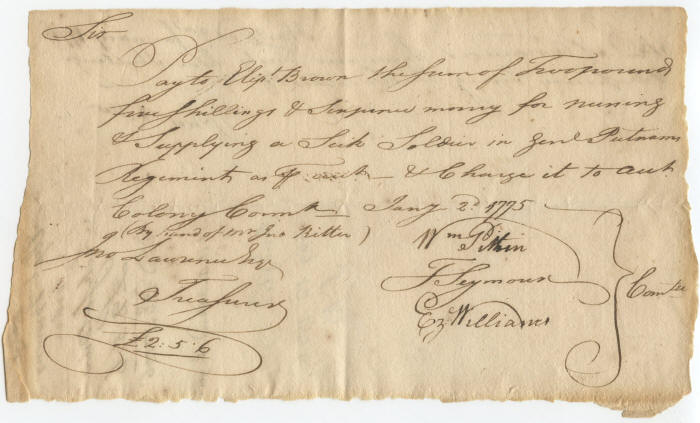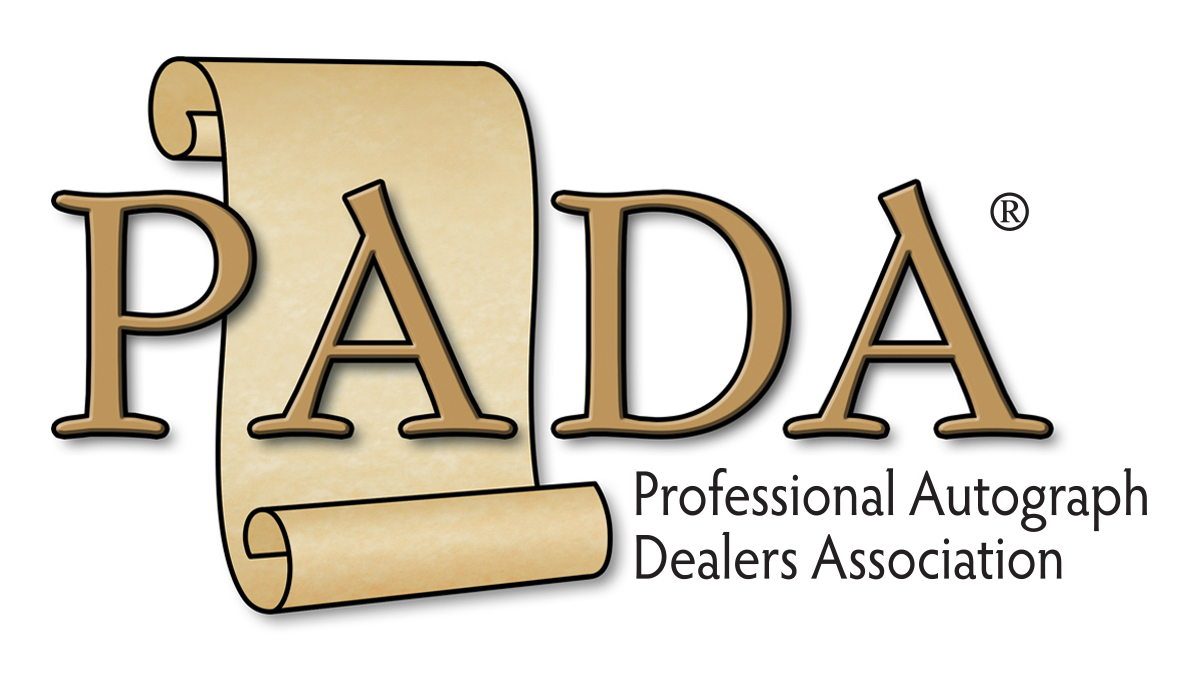1520401
1776 Connecticut Revolutionary War Pay Order
Scroll down to see images of the item below the description
In the crucial year of 1776, the Connecticut committee authorizes payment
for caring for a sick soldier in General Israel Putnam’s regiment
1776 Connecticut Revolutionary War Pay Warrant. One page, 8” x 4¾”, [no place], January 2, 1776 [erroneously dated 1775 on the front].
At the beginning of the crucial year of 1776, during the Continental Army’s Siege of Boston, the Connecticut Committee of the Pay-Table issues this warrant to the Connecticut treasurer to authorize payment for caring for a sick soldier in General Israel Putnam’s regiment in the Continental Army. Three members of the Connecticut Committee of the Pay-Table have signed this warrant to direct the treasurer to make the payment. The warrant states, in full: “Pay to Elijh Brown the sum of Two pounds five shillings & Sixpence money for nursing & Supplying a Sick Soldier in Genl Putnams Regiment as per acct & Charge it to acct Colony Commte – Jany 2d 1775 –” A note reading “(By hand of Mr. Jno Ritter)” addresses the warrant to “Jno Lawrence Esqr / Treasurer / £ 2:5.6” The warrant is signed by William Pitkin, Thomas Seymour III, and Ezekiel Williams as the members of the Committee. Ritter has endorsed and signed the back to acknowledge receipt of the payment.
The warrant is misdated. As often happens at the turn of the year, the scrivener dated this 1775 when the year had just turned to 1776. A note on the back of the warrant in another hand describes it as “Dated 2d Janry 1776” and states, “let it be altered the year 1776.” Another note, in another hand, says that the payment was “audited / May 13– 1776.” Finally, the receipt on the back of the warrant, signed by Ritter, is dated at “Hartford 2nd January 1776.”
This pay order does not identify who the sick soldier was other than to identify him as a soldier in Putnam’s regiment. The only information we have found about Brown is that in May 1776, some four monthas after this pay warrant was signed, the Connecticut Assembly appointed him as an ensign in the fifth company or trainband in Groton in the Connecticut Eighth Colonial Regiment.
Putnam commanded the Third Connecticut Provincial Regiment, one of six infantry regiments that the Connecticut Assembly voted to contribute to the troops who were blockading Boston after the battles of Lexington and Concord on April 19, 1775, and the subsequent battle of Bunker Hill and Breed’s Hill on June 17, 1775. He was central in both the plan to defend the hills in order to secure control of Boston harbor. Breed’s Hill was closer to Boston, and Putnam was likely the one who argued in favor of fortifying it as well as Bunker Hill. Most of the fighting occurred on Breed’s hill.
Meanwhile, on June 14, 1775, the Continental Congress voted to create the Continental Army under the command of General George Washington. Putnam was unanimously appointed as one of three major generals to serve under Washington. When Washington arrived at Boston, Putnam served under him during the Siege of Boston, which lasted from April 19, 1775, to March 17, 1776, when the British forces evacuated Boston by water.
The three signers of this warrant were themselves significant players in the Revolution:
• Seymour (1735–1829) was the head of the Committee of the Pay-Table. He was commissioned a captain of the Connecticut militia in 1773 and promoted to lieutenant colonel in 1774. In 1776, he led three regiments of light cavalry in aid of the Continental Army. Seymour also served five times as Speaker of the Connecticut Assembly during the 18 sessions in which he served between 1774 and 1793. Thereafter, from 1793 to 1803, he was elected annually to the Connecticut Senate. He also served as the first mayor of Hartford, Connecticut, from its incorporation as a city in 1784 until he resigned in 1812.
• Pitkin (1725–1789), who served as a colonel of the Connecticut First Regiment during the French and Indian War, was a zealous patriot who joined the Sons of Liberty in 1765. In 1775, after King George III prohibited shipments of gunpowder to the colonies, the Connecticut Assembly permitted Pitkin and his brother George to establish a mill in order to supply gunpowder for the Continental Army. Since all but Oswald Eveʼs Frankford Powder Mill near Philadelphia discontinued production following the French and Indian War, the Pitkinsʼ mill was the first revolutionary-period powder mill in Connecticut and only the second in the American colonies. It predated Paul Revereʼs powder mill near Boston.
William Pitkin served 19 years in the Connecticut Assembly, and during most of the Revolutionary War he was a member of the Connecticut Committee of Safety. He was elected to the Continental Congress in 1784, and in 1788 he was appointed to the state convention to ratify the United States Constitution. He served 19 years as a judge of the Connecticut Superior Court, which was the colonial Supreme Court, and became Chief Justice in 1789.
• Williams (1729–1818), a successful merchant in Wethersfield, Connecticut, was the older brother of William Williams (1731–1811), a Signer of the Declaration of Independence. Ezekiel Williams was the sheriff of Hartford County from 1767 to 1789, and he served as a member of the Pay-Table beginning in 1775. He was a member of the committee in charge of prisoners of war in Connecticut, and he became the state’s Commissary of Prisoners in 1777.
This is a very nice document. It has three irregular edges, but the placement of the handwriting shows that the paper was originally that way and offers no explanation for why it was not cut straight in the first place. We have seen a few of these documents in similar condition and indeed are currently offering this one signed by Oliver Ellsworth, who was later Chief Justice of the United States. This document has flattened horizontal and vertical folds, none of which affects the signatures of Pitkin, Seymour, and Williams. The writing is uniformly dark and bold. Overall, the piece is in fine condition.
Unframed.









